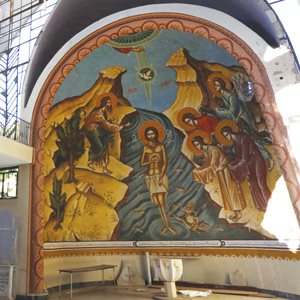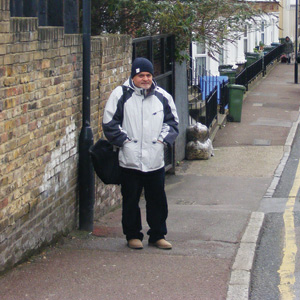Isam (left, not his real name) swipes through photos on his smartphone. “Here is my house in Damascus, in the Old City,” he says, pointing to an elegant living room with an enormous Christmas tree. “
This is where a rocket came through the ceiling last year and destroyed the second floor,” he continues, pointing to a six-inch hole in some white-painted wooden boards. He swipes once more, to a photo where he, his wife and their two teenage sons pose in formal attire. “This was at my nephew’s wedding this summer,” he says. “How life has changed.”
In a coffee shop in Woolwich, south London, Isam tells of his decision to leave his home and embark on a three-week journey to Britain. When the civil war started, he and his wife had no intention of leaving. But his work in tourism quickly dried up and the family had to live off their savings. For the past four years, his Christian neighbourhood had been targeted by Al-Nusra, an al-Qaeda offshoot. The Catholic family had lost relatives and friends and Isam wanted to move them to safety.
He concluded: “I couldn’t see any safe future for my sons. My wife said, ‘you go first’.”
So on 11 August, Isam flew from Beirut to Istanbul, then headed to Izmir. He knew of the risks of crossing to Greece in an overcrowded dinghy, so he paid smugglers €4,000 (£2,900) to travel in a small yacht with six others.
They were taken to the Greek island of Chios and from there he sailed to Athens, where he paid €6,000 (£4,350) for a fake passport which he used to board a plane from Rhodes to Gatwick. “Officials at Gatwick recognised it straight away so I showed them my Syrian passport and said, ‘I’m seeking asylum’.”
The British Government, at the end of a summer defined by the images of thousands of Middle Eastern migrants risking their lives to reach Europe, announced that it would extend its Vulnerable Persons Relocation Scheme to take 20,000 Syrian refugees registered with the UN High Commissioner for Refugees (UNHCR) over the next five years.
The first families landed in Britain last month, some in London, some in Glasgow, and were quickly dispersed to local authorities that could house them. With council housing in England and Wales in short supply, the Government is funding the first year’s accommodation from the overseas aid budget.
Isam says he tried to register as a refugee with the UNHCR in Lebanon, which has accepted more than 1m Syrian refugees. In 2012 he asked for resettlement but at the time there was no such programme and instead he was offered food aid, which he did not need. “The next time, they told me I had to be in Lebanon for a month before they could register me. They gave me an appointment for a month’s time, but just before, they cancelled registration for all refugees.”
He had already tried applying for visas to Britain, to other EU countries, to the US “several times … but my applications were rejected”.
Once in London, he looked for help. He tried two Catholic Churches – one said it didn’t know where he could turn for help, the other said it would ring him and never did. “You don’t like to nag,” he says. So he tried Westminster Library and was directed to the Citizens Advice Bureau, which pointed him to the Migrants Resource Centre and Soho’s Notre Dame Refugee Centre, where one of the other visitors told him there was a Syrian Anglican priest in London, the Revd Nadim Nassar. Isam made contact with Nassar and the priest tried to find a family who could put him up. Then his bishop, Michael Ipgrave of Woolwich, put him in touch with a Catholic couple nearby. They agreed to take him in, and the Home Office provided a room in a shared house a month later.
Isam cannot praise his former hosts enough. After two weeks in a backpackers’ hostel, “I had no money, I could have ended up on the street … They still check up on me. They are my new family.” In his shared room the curtains hang off the sagging plastic rails, he finds the kitchen too dirty to cook in and he receives £35 a week to live on. But the ongoing friendship of his former hosts gives him “hope to carry on”.
Abigail Frymann Rouch is The Tablet’s former online editor.





 Loading ...
Loading ...
What do you think?
You can post as a subscriber user...
User Comments (0)